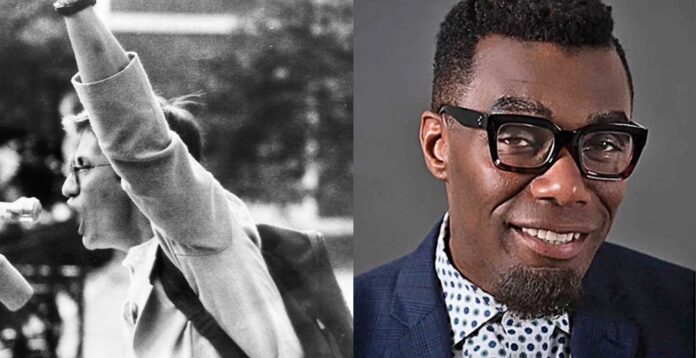Philadelphia City Council members introduced resolutions to honor two LGBTQ Philadelphians for their lasting contributions to the community: Michael Hinson, Jr. and Rita Addessa. Both passed away in 2022.
City Councilmember Kendra Brooks introduced the resolution honoring Hinson, with testimony from Chris Bartlett, David Fair and José de Marco.
“Michael Hinson was a fearless and compassionate advocate for Philadelphia’s most overlooked communities, especially Black and Latino LGBTQ and homeless people,” de Marco said in an email. “He once told me white government does not care about poor Black communities until they are forced to make changes.”
Hinson’s work was a force of change for LGBTQ and Black and Brown people in Philadelphia. He founded the community resource Colours Magazine, which later became the Colours Organization and AIDS service agency. Former Mayor John Street hired Hinson as an LGBTQ liaison and policy advisor in 2000, which paved the way for the formation of the Office of LGBT Affairs. Hinson later helped build a coalition to make sure that gender identity was added to Philadelphia’s Fair Practices Ordinance; he co-founded Philadelphia Black Pride; he acquired funding for the LGBTQ health clinic that is now Mazzoni Center; and thanks to his work advising the Department of Human Services on local policy changes, Bethel House, Philly’s first LGBTQ housing facility for queer youth, was created.
In line with his advocacy work for people experiencing homelessness, Hinson became president and chief operating officer of SELF, Inc. in 2017, an organization that provides emergency and permanent housing services, among other services, to vulnerable communities in Philadelphia. He co-chaired the City of Philadelphia’s Roadmap to Homes board; served as treasurer of the board of Philadelphia Family Voices and participated in the Million Man March on Washington in 1995.
City Councilmember Helen Gym introduced the resolution honoring Addessa, a civil rights activist and the first executive director of the Philadelphia Lesbian and Gay Task Force (PLGTF). She played an instrumental role in the 1982 passage of Philadelphia’s gay rights ordinance, which banned discrimination based on sexual orientation in housing, employment and public accomodation.
“Rita was fierce and tireless in all her work, never resting when there was work to be done,” Gym said in an email. “I first met her when I was a new teacher and we were writing the new curriculum standards together. Rita never backed down from anything or anyone. There are few people with the breadth of organizing experience and depth of impact that Rita carried over her life. In honoring her legacy, we are recommitting our city and ourselves to the transformative power of organizing and to building a more equitable city for all.”
As part of her work leading the Task Force, Addessa held local organizations accountable for refusing to invest in LGBT organizations; demanded that the state District Attorney recruit LGBTQ assistant DAs; and lobbied the Philadelphia Police Department to mandate sexual orientation training for police officers.
Addessa’s activism did not stop at the governmental level. She fought to have the Philadelphia School District amend its curriculum to require that LGBTQ students receive equal treatment. That work precipitated a policy requiring Philadelphia school teachers to implement a curriculum that included gender equity and lessons that embraced racial and cultural diversity.
On top of those initiatives, Addessa and her colleagues worked to foster awareness of LGBTQ issues in the public mind and created TV and media ads that featured fair LGBTQ representation. Addessa and the PLGTF, who formed a violence hotline and carried out surveys to chart violent acts and discrimation toward LGBTQ people, used that data to coerce city officials to create protective policies.

